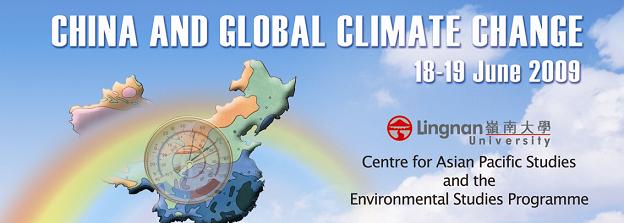
Event Title
Conference on China and Global Climate Change : Reconciling International Fairness and Protection of the Atmospheric Commons
Location
AM308, Lingnan University
Start Date
18-6-2009 2:00 PM
End Date
18-6-2009 3:30 PM
Language
English
Description
The use of diplomatic brinkmanship by the USA and her more recent uncooperativeness with global response to the climate crisis (Kyoto Protocol) under the presidencies of George W. Bush and Bill J. Clinton has led to fears in quarters that China, a rapidly industrialising country might opt to become uncooperative in the global climate change efforts. We use suitable conceptual frameworks of international relations to review the US’ previous conduct in international relations during the “cold war” among others to analyse recent issues pertaining to global carbon reduction under the Kyoto Protocol. We argue that China’s rising profile in economic, political and social spheres especially the way it offers loans on softer terms compared to the Western Consensus model, her ratification of the Kyoto are among the several indications that her relationship with the USA and other nations in carbon reduction portend good relationship in future. We argue also that Presient Obama’s promise of acknowledging the reality of climate (change) science and to lead other nations in responding to the crises seem to be getting fulfilled based on recent evidences. We conclude that the future for global cooperation between the USA and China, on one hand, and between USA and the rest of the world, on the other, present grounds for optimism that global carbon reduction would proceed more peacefully and profitably than it was hitherto.
Document Type
Discussion
Recommended Citation
Ingwe, R., Agi, S. P. I., & Okoro, J. (2009). Emerging opportunities for responding to climate change in the Obama administration: Why China should propel developing countries towards global carbon reduction cooperation. In China and global climate change: Proceedings of the conference held at Lingnan University, Hong Kong, 18-19 June 2009 (pp. 238-252). Centre for Asian Pacific Studies and the Environmental Studies Programme, Lingnan University, Hong Kong.
Included in
Emerging opportunities for responding to climate change in the Obama administration : why China should propel developing countries towards global carbon reduction cooperation
AM308, Lingnan University
The use of diplomatic brinkmanship by the USA and her more recent uncooperativeness with global response to the climate crisis (Kyoto Protocol) under the presidencies of George W. Bush and Bill J. Clinton has led to fears in quarters that China, a rapidly industrialising country might opt to become uncooperative in the global climate change efforts. We use suitable conceptual frameworks of international relations to review the US’ previous conduct in international relations during the “cold war” among others to analyse recent issues pertaining to global carbon reduction under the Kyoto Protocol. We argue that China’s rising profile in economic, political and social spheres especially the way it offers loans on softer terms compared to the Western Consensus model, her ratification of the Kyoto are among the several indications that her relationship with the USA and other nations in carbon reduction portend good relationship in future. We argue also that Presient Obama’s promise of acknowledging the reality of climate (change) science and to lead other nations in responding to the crises seem to be getting fulfilled based on recent evidences. We conclude that the future for global cooperation between the USA and China, on one hand, and between USA and the rest of the world, on the other, present grounds for optimism that global carbon reduction would proceed more peacefully and profitably than it was hitherto.

